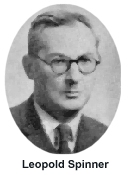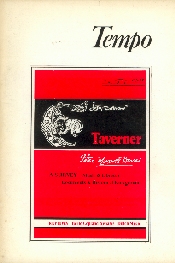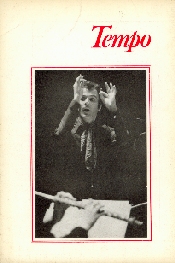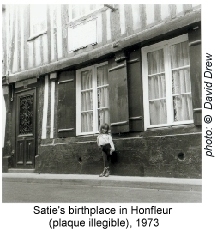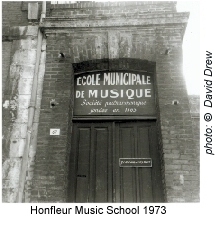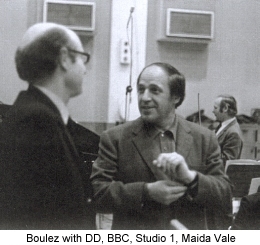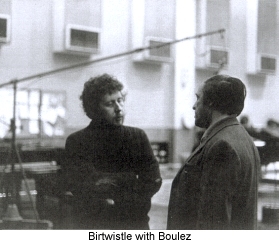| 1971-75 |
European Representative and
Adviser, The Kurt Weill Foundation.
|
| 1971 |
Appointments: (to 1980), BBC
Music Advisory Committee; (to 1976) Music Panel, Arts Council of Great Britain,
and Chair, British section of ISCM, and ACGB's Contemporary Music Network
(director: Annette Morreau)
5 January: Death of
Roberto Gerhard.
February/March:
Appointed Editor of Tempo - the quarterly review of modern music
published by Boosey & Hawkes - following the sudden and untimely death (in
February) of its previous editor, Colin Mason.
6 April: Death of
Stravinsky. The first issue of Tempo under D's editorship is a
double issue in Stravinsky's memory. 'Canons and Epitaphs' are contributed by
17 composers:
|
|
Berio
|
Copland |
Milhaud |
|
|
Lennox Berkeley
|
Denisov
|
Schnittke |
|
|
Birtwistle
|
Goehr
|
Sessions |
|
|
Blacher
|
Lutyens
|
Tippett |
|
|
Boulez
...explosante-fixe... |
Maw
|
Hugh
Wood |
|
|
Carter |
Maxwell Davies
|
|
Devises a concert at St
John's Smith Square which intersperses the complete set of
Canons and Epitaphs with relevant small-scale
works by Stravinsky. With Stephen Plaistow, plans a 'Stravinsky
Day', on the BBC's Music Programme, with each of the Canons and Epitaphs
played at regular intervals and then, at the end of the day's broadcasting,
recapitulated in a newly ordered sequence.
Adviser to Holland Festival
(Director, Jo Elsendoorn), for Kurt Weill events including world-premiere of
the recently discovered (by O.W. Neighbour) Recordare, and the
post-war premieres of the Silbersee score in its full orchestral form,
and of the complete Royal Palace, with the 1968 Schuller orchestration
supplemented by Noam Sheriff (Schuller himself being unavailable).
European Broadcasting Unioncommissions a version of Weill's partly lost
Divertimento for a concert in January 1972. Collaboration with Christopher
Shaw.
|
| 1972 |
10 January: Ernest
Bour conducts the soloists and orchestra of Sudwestfunk, Baden-Baden, in the
premiere of the Shaw-Drew version of Weill's Divertimento.
Spring: Tempo
101 is a special issue dedicated to the opera Taverner by Peter
Maxwell Davies, which is due to have its world premiere at the Royal Opera
House, Covent Garden on 12 July - conductor, Edward Downes, producer Michael
Geliot, designer Ralph Koltai. The issue of Tempo includes essays on
the libretto, the music, and the historical Taverner, and is received with
dismay by a senior executive at Boosey & Hawkes, who is not alone in
considering the opera blasphemous, and asks whether a similar issue is planned
in connection with the forthcoming production at Glyndebourne of The Visit
of the Old Lady by Gottfried von Einem.
April-November:
Agreements with the publishers of Grove's Dictionary of Music and
Musicians to supply six contributions to The New Grove
(1980). Requests for three major contributions on French composers - which
would have entailed a minimum of a year's work - are regretfully
declined.
Summer: Publication of
Twelve Questions for Leopold Spinner in Tempo. It marks
the start of a lasting commitment to the composer and his music.
Autumn: Styrian Autumn
Festival in Graz. With Dallapiccola to the premiere, in a nearby town,
of his Commiato. Meetings there and in Graz with Witold
Lutoslawski.
|
| 1973 |
Advisory Board of the New
Opera Company (until its merger with English National Opera, ca. 1983).
During part of the same period, is a member of a ballet subcommittee at the
Royal Opera House. 
Introduced to D by Karl
Miller, the Scottish writer and composer Malcolm (Calum)
MacDonald is appointed Assistant Editor of Tempo. He will also
afford invaluable assistance with the next productions in the Music
Today recording series.
May: Commissioned by
Lotte Lenya to establish and manage the European Office of the Kurt
Weill Estate, with special responsibility for liaising with Universal Edition
(Vienna and London) and Schott-Mainz, in the task of promoting their entire
Weill catalogues throughout Europe. It is not a development unanimously
supported by Lenya's New York circle. Within a year, Drew's formal proposal of
a newly constituted Weill Foundation, with scholarly, archival, and
promotional objectives, will be, in effect, suppressed. (His proposals -
incorporated in a document of which no copy has been traced - are broadly
modelled on Paul and Gertrude Hindemith's testamentary provisions
regarding the Hindemith Foundation in Blonay, Switzerland, and the Hindemith
Institute in Frankfurt.)
June: to Reykjavik for
the 47th ISCM Festival. Hears Notturno by Helmut Lachenmann.
Summer: On holiday in
Normandy, DD visits Honfleur and the birthplace of Erik Satie. It is a purely
sentimental visit, without ulterior purposes (D will publish nothing further
about Satie for several decades). Even as late as 1973, the imminent and
extraordinary change in the composer's fortunes is hardly foreseeable. Bringing
posthumous fame and media success to a hitherto marginal figure, it would
immeasurably increase the commercial exploitation of his music.
7-11 November:
Delivers a paper at the 'Theater im Exil 1933-45' conference and exhibition
organised at the West Berlin Academy of Arts by Dr Walter
Huder.
December: Writes for
The New Grove an entry on Christopher Shaw, which will be
published in an abbreviated form.
Second series of Music
Today, on Decca's ARGO label is inaugurated by three new releases:
Messiaen, Tippett; Maxwell Davies(Points and Dances
from 'Taverner'/Second Fantasia on John Taverner's 'In Nomine');
Sessions, Musgrave, Riegger. The correspondence and
meetings with Roger Sessions that had preceded the Music Today
recordings will continue on a regular basis in the coming
years.
|
| 1974 |
Ulrich Eckhardt,
Director of the Berliner Festwochen, engages D to advise the Festival in
connection with two forthcoming Composer Portraits: Schoenberg (already planned
for 1974) and Weill for 1975. For the latter D plans an integrated series of
programmes, including a major orchestral concert and, it is hoped, several
stage productions. At least one American musical is agreed to be a priority.
The programme will also include several concert sequences and suites devised by
D specially for the occasion. Lenya will be guest of honour, and is to
give a song recital at the Academy of Arts, based on new Weill repertory.
|
New pieces by young
composers are to be included. Discussions with Henze's
composer-collective come to nothing - the collective interest is in
Eisler, not Weill.
Summer: First
meeting with Robin Holloway, with a view to his writing a piece for the
London Sinfonietta's projected concerts at the 1975 Festwochen. The piece that
will take shape over the next twelve months, eventually to be entitled
Concertino No.3, is subtitled 'Homage to Weill' but is in no respect an
imitation or pastiche. |
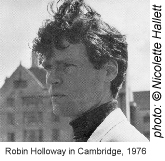 |
June: Attends 48th
ISCM Festival in Rotterdam as representative of the British section. Hears for
the first time music by Wolfgang von Schweinitz (Opus 6). Meetings with
Louis Andriessen in Amsterdam; discussion of Stravinsky à
propos of Andriessen's work-in-progress with Elmer Schönberger (The
Apollonian Clockwork).
July: Visits Lenya in
New York, and discusses the Berlin programmes in detail. At her request meets
Kim Kowalke, who has written to her concerning a proposed dissertation
on Weill for Yale University. They discuss various approaches and specific
topics. Their collaboration during the next 12 months will mark the beginning
of a working relationship that continues to this day.
Is commissioned by Siegfried
Unseld to edit for Suhrkamp Verlag (Frankfurt) two paperback collections, with
extensive introductions: ÜBER KURT WEILL, and WEILL:
AUSGEWÄHLTE SCHRIFTEN. The deadlines for these two projects and
for the Berlin programmes have to be reconciled with an urgent request from
Universal Edition to review his (and Hugo F. Garten's) 1965 post-Neher
revision of Die Bürgschaft, for a projected production in
Zurich. Finding much that needs refurbishment, D returns to the libretto
whenever time can be found for it, and will complete his work in a provisional
bilingual form in 1975 - unfortunately too late to resume the collaboration
with Garten.
Autumn:As sponsors of
the Music Today series, the Gulbenkian Foundation have agreed that after
the projected Birtwistle recording, the series will conclude with a 13th
LP: one side, Dallapiccola, the other - subject to Dallapiccola's
approval - music by an unpublished and more-or-less unknown composer. The
composer decided upon is Christopher Shaw. In preparation for the
recording, the BBC broadcast a performance of Shaw's Cantata, Peter and the
Lame Man, conducted by Colin Davis.
Dallapiccola in London
for Music Today recordings. Boulez conducts the recording of
Birtwistle's The Triumph of Time for the same series.
December: First
approach from Boosey & Hawkes regarding a senior executive position
likely to be offered within the coming weeks. Begins work on the Weill
entry for The New Grove - by far the longest of the six
contributions. |
|
